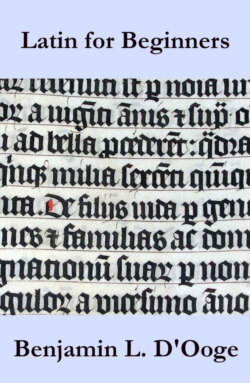Читать книгу Latin for Beginners - BENJAMIN L. D’OOGE - Страница 39
На сайте Литреса книга снята с продажи.
«77.» DIALOGUE GALBA AND MARCUS
ОглавлениеFirst learn the special vocabulary, p. 285.
G. Quis, Mārce, est lēgātus cum pīlō et tubā?
M. Lēgātus, Galba, est Sextus.
G. Ubi Sextus habitat?[2]
M. In oppidō Sextus cum fīliābus habitat.
G. Amantne oppidānī Sextum?
M. Amant oppidānī Sextum et laudant, quod magnā cum cōnstantiā pugnat.
G. Ubi, Mārce, est ancilla tua? Cūr nōn cēnam parat?
M. Ancilla mea, Galba, equō lēgātī aquam et frūmentum dat.
G. Cūr nōn servus Sextī equum dominī cūrat?
M. Sextus et servus ad mūrum oppidī properant. Oppidānī bellum
parant.[3]
[Footnote 2: «habitat» is here translated does live. Note the three possible translations of the Latin present tense: «habitat» he lives he is living he does live Always choose the translation which makes the best sense.]
[Footnote 3: Observe that the verb «parō» means not only to prepare but also to prepare for, and governs the accusative case.]
[Illustration: LEGATUS CUM PILO ET TUBA]
